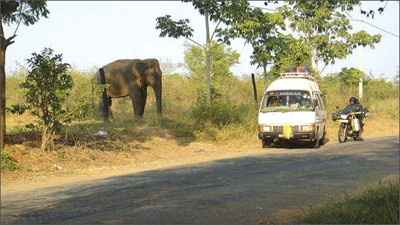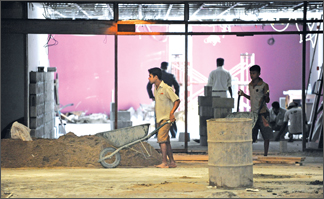|
To utilise untapped potential of rural people in Uva:
SLCB promotes tourism
By Lalin FERNANDOPULLE
|

Uva to entice more visitors
|
In line with the need to promote local tourism the Sri Lanka
Convention Bureau (SLCB) launched a program to develop tourism in the
Uva province.
The Uva Tourism Development Project was launched under the directive
of the Minister of Tourism Achala Jagoda.
The Uva province is home to a large sector of bio-diversity, natural
resources and historical sites while it is also the most poverty
stricken region with household income at an alarmingly low level.
The Uda Walawe and Yala national parks, Badulla, Bandarawela, Ella,
Haputale, Buttala, Thanamalwila, Wellawaya and Kataragama are places
frequently thronged by local and foreign tourists.
Beneath the rich natural heritage lies the vast untapped potential of
the rural people whose skills have faded away unutilised.
The Ministry of Tourism embarked on this mega project with the aim of
alleviating poverty through income generating opportunities for a wider
segment of the society who live a hand to mouth existence.
Chairman, SLCB, Salinda Bandara said work on the project is
progressing well and now it is at the stage of identifying new locations
and training people for various professions.
With foreign tourists flocking in large numbers at all prime
locations across the country promoting the indigenous culture in the
village was essential, he said.
"Camping sites, information centres, direction boards and a website
has been launched under the project to attract local visitors to the
province.
All activities are carried out with the participation of the local
community", Bandara said.
Tourism has much potential in the Uva province to create employment,
regional development and multiple spin-offs for rural poverty
alleviation.
As majority of the employees in the sector are not trained, steps
have been taken to improve the quality.
Tourism in Sri Lanka has rebounced following the complete eradication
of terrorism last year.
Tourist arrivals recorded a significant growth this year bringing
much needed foreign exchange to the country.
SLCB promotes Sri Lanka as a venue for MICE tourism which makes a
vital contribution to the tourism industry.
The tourism development and other promotional arms of the industry
have been vested with the task of attracting 2.5 million tourists per
year by 2016.
Sri Lanka hotels dress up for post-war rush
Sri Lanka's hotel owners are racing to refurbish and add thousands
more rooms as foreign holidaymakers pour into the country after the end
of nearly four decades of bloodshed.
|

Sri Lankan workers labour inside the construction site of The
Cinnamon Grand Hotel in Colombo on March 12. Sri Lanka’s hotel
owners are racing to refurbish and add more rooms as foreign
holidaymakers pour into the country after the end of nearly four
decades of ethnic conflict. (AFP) |
Leading hotel groups plan to spend millions of dollars on new decor
and facilities for the influx of tourists drawn to the plentiful
sunshine, beaches and tropical wildlife on the Indian Ocean island
nation.
The ambitious expansion comes amid a post-war revival that has pushed
up hotel room rates and given the hospitality industry something to
cheer for the first time in years.
For once, after seeing tourists put off by violence and travel
warnings from foreign governments, the industry says it is struggling to
find places for the visitors, most of whom come from Britain, Germany,
France, India and Japan.
"Hotels are overbooked, a 'problem' which our hotels have not
experienced for a very long time," said Srilal Miththapala, who heads
the Tourist Hotels Association of Sri Lanka.
Counting on this solid demand, many are now investing in new
furniture, bars, restaurants, swimming pools and extensions.
Sri Lanka's tourist board expects the total number of hotel rooms to
grow from about 15,000 now to 22,000 in the next two years.
In a sign of the changes under way, Sri Lanka's biggest leisure
operator John Keells Holdings is partially refurbishing one of its
flagship Colombo hotels, while two of its beach-front resorts are set
for a complete facelift.
The group's resort in the eastern seaport town of Trincomalee, once a
hotbed for Tigers, will re-open in May as a retro-chic five-star hotel.
"With the war behind us, there is pent-up demand for a bit of luxury
targeting well-heeled guests.
We're very bullish," said its deputy chairman, Ajit Gunewardene.
The Tigers, who waged a 37-year separatist war of suicide bombings,
assassinations and military offensives, were crushed by government
forces last May, finally bringing peace to the Buddhist-majority nation.
John Keells, which owns seven resorts and two city hotels with 1,600
rooms, will spend in excess of 900 million dollars over three years to
renovate and build three hotels, Gunewardene said.
Rival operator Aitken Spence Group says it is spending nearly 30
million dollars in the next year to spruce up properties and build three
hotels in the island's North and East.
Shiromal Cooray, a director at the Jetwing Group which manages a
chain of 10 hotels, admitted that significant improvement was needed
because nearly half of the country's current hotel rooms are below
so-called "star class."
Jetwing plans to spend more than seven million dollars this year to
improve its properties.
Dileep Mudadeniya, who heads the Sri Lanka Tourism Promotion Bureau,
says most hotels have been fully occupied in the past three or four
months.
A key foreign exchange earner, the number of holidaymakers in
February soared 68 percent to 57,300 over the same month a year earlier,
according to tourist board figures.
"Forward bookings are encouraging," said Mudadeniya. "I was told that
20 to 30 hotels are closed for any new reservations till the end of
March because they are fully booked."
The industry is hoping to attract 2.5 million visitors by 2016, up
from 447,890 in 2009, the final year of hostilities.
It is also hoping to earn two billion dollars annually in tourist
revenue by 2016, up from 350 million dollars last year.
The downside for holidaymakers is that the days of bargain hotel
rates in Sri Lanka appear to be over.
A year ago, visitors could easily get discounts of 50 percent or more
on advertised room rates.
"There are virtually no rooms in the Southern resorts.
Bookings are heavy," said Lakal Jayasinghe, who manages the Tangerine
Beach Hotel, a deluxe beach resort in the south.
AFP
New bonus miles from Emirates
Emirates passengers travelling from Colombo to Singapore, Melbourne
or Brisbane till the end of March can earn up to 9,000 bonus Skywards
Miles from the airline's frequent flyer programme in an exciting new
promotion.
These bonus Miles are in addition to the Skywards Miles they are
already entitled to and the bonus miles they would normally earn if they
fly First or Business Class, the award-winning Dubai-based carrier said.
The additional bonus miles come from the new Miles Accelerator
feature introduced by Emirates to enable Skywards members to earn extra
miles on selected flights.
Coinciding with the designation of Colombo-Singapore,
Singapore-Brisbane and Singapore-Melbourne flights as Miles Accelerator
flights in March, Emirates has also introduced special fares that will
be applicable on these sectors in this period.
Consequently, a Colombo - Singapore Economy Class return ticket is
now available for Rs 31,900 inclusive of taxes and surcharges and will
earn the passenger a total of 3,200 Skywards Miles, including a bonus of
1,500 miles.
Similarly, a Business Class return to Singapore will cost Rs 80,900
all-inclusive, and earn the passenger a total of 7,250 miles, of which
the Miles Accelerator bonus will be 3,000 miles.
An Economy Class return ticket to Melbourne or Brisbane is priced at
Rs 89,600 and Rs 91,900 respectively and will earn 4,500 and 5,500 bonus
miles, while a Business Class return journey to the same destinations
will each earn up to 9,000 bonus miles.
Devika Ellepola, Emirates Sales Manager in Sri Lanka said: "These
bonus miles represent a substantial value addition, which together with
the Skywards Miles accrued, could be redeemed for free tickets.
This is therefore an opportunity that frequent flyers as well as Sri
Lankans visiting friends and relatives or simply going on holiday will
welcome."
The Miles Accelerator bonuses are valid for fares purchased before
31st March 2010.
The winner of more than 400 international awards, Emirates operates
five flights a week from Colombo to Singapore.
The airline operates 70 flights a week from Dubai to Australia,
providing convenient connections to four destinations on the continent.
Sydney is served with three daily flights, seven days a week, and Perth
with double daily services. Daily flights from Dubai to Melbourne and
Brisbane operate via Singapore, and Emirates also serves Melbourne with
daily direct flights from Dubai and via Kuala Lumpur.
Emirates doubles up on Heathrow double-decker
Emirates is to add another A380 to its London-Heathrow route from
July 1 this year, making the popular superjumbo experience more widely
available to passengers.
The airline brought its own brand of double-decker, equipped with an
Onboard Lounge and Shower Spas, to the British capital in December 2008.
In addition to the daily EK 001 from Dubai, the A380 will also be
deployed on EK 003 Salem Obaidalla, Emirates' Senior Vice President,
Commercial Operations, Europe and Russian Federation, said: "This is an
important development for Emirates as this is the first route where we
have made a long term commitment to double up on the double-decker."
Obaidalla said: "London Heathrow was one of the key airports we had
in mind when the A380 was first conceived and the new deployment allows
more passengers travelling to and from the British capital to experience
this remarkable aircraft." |

